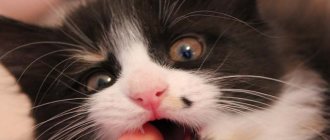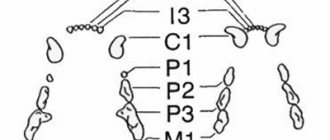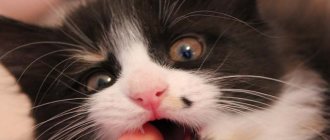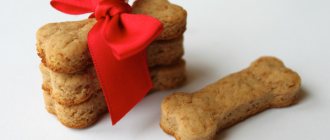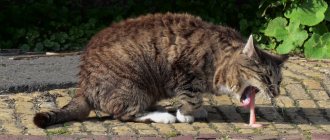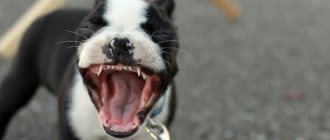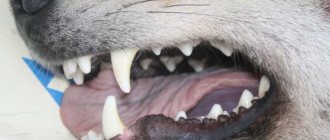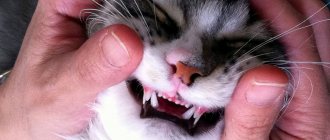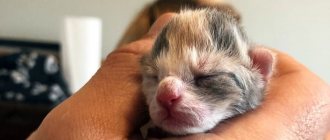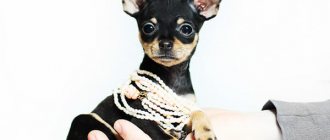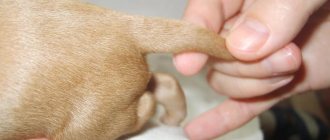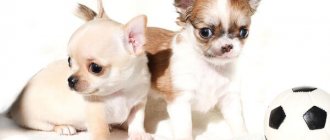Teeth are tools that play a significant role in a cat’s life. After all, the success of the hunt depends on the teamwork of teeth and claws. This predatory instinct is still strong in cats, despite centuries of domestication. Having decided to have a small pet predator for the first time, a person is faced with many questions about caring for a pet, including: do cats have baby teeth?
If so, when do they fall out, and how do you understand that the process of changing teeth has begun? The answers to these questions can be found in the article below.
When do kittens get teeth?
When teeth change, symptoms
The cat's mouth contains 14 teeth on the lower jaw and 18 teeth on the upper jaw. By 8 months, baby teeth should fall out and molars will grow in their place.
Changing teeth in Maine Coons is a natural process. It begins at the age of 4-7 months. At birth, kittens have no teeth; after three weeks, the first front incisors grow.
Some people don’t even know when Maine Coons’ teeth change, since the pet’s behavior does not change. However, in most cases, kittens begin to play around and chew on all objects that do not lie well.
If your pet starts biting people, it means teething has started. This is not a pleasant process, as the gums become inflamed and become more sensitive.
In rare cases, permanent teeth grow next to baby teeth, which causes pain for the pet.
At what age does replacement occur?
Already from the age of three months, the baby's milky bone processes in the mouth begin to fall out.
When the kitten is 3-4 months old, the baby teeth fall out and change. Permanent teeth are cut gradually - first, new incisors appear, then fangs, small and large on the sides. Maximum up to 8 months. In life, they are all located in their places, and consist of 14 lower and 16 upper. If the process itself is asymptomatic, then it can be noticed by the pet’s behavior. At this time, cats begin to chew everything, they often salivate heavily, and a smell appears from the mouth, which is absolutely natural.
What to do
If you notice changes in behavior, check to see if your Maine Coon's teeth are changing. This is evidenced by inflammation and redness on the gums.
In this case, the pet needs to be wiped with a decoction of chamomile, oak bark, and sea buckthorn oil. You can find special ointments at your veterinary pharmacy.
If a kitten scratches its teeth on its owner, this should not be encouraged. This habit may persist over time, making it more difficult to wean a Maine Coon.
The pet store sells special toys for kittens whose teeth are changing. They are soaked in a solution of catnip, which will undoubtedly attract the baby.
Examination of the jaw is important when changing teeth. If you notice the proximity of milk and molar teeth, you need to visit a veterinarian. It is strictly forbidden to remove temporary teeth on your own; this can cause irreparable harm to your pet.
Changing teeth in Maine Coons is a natural process/Yandex Collections
This anomaly causes the development of malocclusion. Pathology is a reason for disqualification at exhibitions and reduces the quality and life expectancy of a cat.
Don't forget to brush your teeth regularly. Maine Coons are prone to developing caries and tartar formation. Removal of the latter is permissible only in a veterinary clinic.
You can prevent caries by daily rubbing your teeth with rosehip decoction. In addition, nutrition directly affects the condition of the oral cavity, so choose high-quality and balanced food.
Nurseries
You can find a cattery through a cat club, on the Internet, or at exhibitions.
You can wait for the kittens to arrive by booking them in advance. Catteries usually have their own Internet - a resource where information about all cats, cats, matings, exhibitions, and connections with foreign breeders is indicated. Professional breeders are interested in acquiring new animals every two to three years.
If the same animals constantly mate with each other, and there is no influx of new blood, it means that the owner makes money from reproduction and sale, and he is not interested in improving the quality of the breed. A professional breeder will definitely invite the future buyer to the nursery, show all the animals, and help with choosing a kitten. If the weight of the male cat has been declared, you can ask for a control weighing - this is a normal procedure.
There are nurseries in apartments and outside the city. Even if it is located far from the city, it is better to visit it. When purchasing, an agreement will be concluded between the buyer and the seller on how the animal is planned to be used, how it can and cannot be crossed, and how the matings will take place. Nurseries provide all documents for kittens.
Immunity. Is it possible to get vaccinated?
During the period of teeth change, the immunity of Maine Coons is weakened. Vaccination is carried out at 3-4 months. This is important because when replacing baby teeth with molars, Coons have a greater chance of contracting the disease. If this could not be done, vaccinations are done closer to a year.
Pets undergoing teeth replacement can easily catch a virus and infection, so you shouldn’t walk them outside.
It is recommended to wash shoes with disinfectants after returning home, especially if the kitten has access to them.
Intrabreed diseases
The most serious diseases of Maine Coons are hereditary, so the selection of breeding animals must be very careful. The most dangerous hereditary diseases among representatives of this breed are:
- Hypertrophic cardiomyopathy. The cause of this disease is hardening of the heart muscle, which can lead to embolism or complete cardiac arrest. The disease is caused by a disorder in the genes that produce a protein that helps stimulate heart contraction.
- Spinal muscular atrophy is a severe hereditary disorder in which spinal cord neurons die and muscle tissue is destroyed.
- Hip dysplasia. This disease is not life-threatening for the animal, but it turns the pet into a disabled person and is accompanied by lameness, pain and frequent dislocations.
- Polycystic kidney disease. This disease is congenital in nature, in which the kitten is born with cysts in the kidneys. As they grow, they can lead to disruption of the functioning of organs, and then to their complete failure.
No treatment for hereditary diseases can completely restore a cat’s health, so it is very important to identify animals carrying the disease and exclude them from breeding.
Complications when changing teeth
Most often, Maine Coon teeth change without complications. When owners observe reddened and inflamed gums, they are horrified and run to the veterinarian for a consultation.
However, this is a normal phenomenon and does not require additional procedures.
Symptoms to watch out for:
- lack of appetite;
- excessive gum inflammation;
- lack of activity;
- formation of suppuration on wounds;
- state of anxiety;
- The baby teeth have not fallen out, although the permanent ones have already grown.
If you observe at least one of the symptoms, you should immediately contact a veterinarian for help.
Do not self-medicate, as the cat could have an infection that could threaten its life.
One of the serious complications is gingivitis. Main symptoms:
- inflamed gums and palate;
- poor appetite;
- bleeding;
- unpleasant odor from the mouth;
- tousled fur on the chest.
If one of the symptoms is detected, take the cat to a veterinary clinic. Otherwise, the risk of developing periodontal disease increases, as a result of which the cat will lose all its teeth.
Change of teeth in Maine Coons most often occurs without complications/Yandex Collections
Results
All breeds of kittens need calcium support during teething - give them cottage cheese, cream and milk, fermented milk products. Their fat content should be neither high nor zero. Don't forget about the proteins contained in meat and chicken cartilage. Phosphorus is found in sea fish, and porridge is a source of carbohydrates. Complex vitamin and mineral supplements should support your immune system.
Dental care may include periodic examination for inflammation or stone formations. Teeth brushing should be done for pets who eat small pieces of wet food. The procedure is carried out daily and from a very early age.
After washing your hands, the pet is placed on your lap. With one hand they open his lips. The second hand makes circular movements with the brush. Wool should not get into the mouth. After completing the procedure, the pet is praised and treated with something. Owners who take care of their kitten's oral health will prolong their health for a long time.
What to feed
Some caring owners, when Maine Coon kittens' teeth change, feed them exclusively soft food. This method of feeding is erroneous.
When changing baby teeth to permanent ones, the diet cannot be changed. It is supplemented only with fortified supplements purchased at a veterinary pharmacy.
In particular, it is necessary to ensure sufficient amounts of calcium and phosphorus in food.
- When changing teeth, kittens should be fed the following foods:
- dry fortified food;
- porridge;
- red meat;
- vegetables;
- cartilage;
- dairy products.
Veterinarians recommend not giving up dry food, as it contains minerals that prevent the development of caries and tartar.
Choose ready-made food according to the age of your pet. This food will be the most balanced.
Shedding
Seasonal renewal of fur occurs in spring or early summer. The Maine Coon sheds quite quickly and, with regular brushing, does not cause trouble to its owners.
Older Maine Coons undergo age-related shedding, which lasts from 12 to 18 months. During this period, the animal sheds a lot and loses most of its fur, so it is very important to give your pet vitamins and make sure that the food corresponds to the age norm of the pet.
The following factors can also lead to sudden hair loss:
- skin parasites;
- worms;
- metabolic disease;
- diseases of internal organs;
- unbalanced diet;
- pregnancy;
- elderly age;
- stress.
A veterinarian can help you find out why your cat sheds. He will conduct an examination, make a diagnosis and prescribe treatment.
How to brush your teeth
Maine Coon teeth brushing is practically no different from human brushing / Yandex Collections
Buy a special toothpaste at a veterinary pharmacy, then follow the instructions:
- Take the cat;
- Lay it on its side;
- Gently expose your teeth;
- Apply paste to brush;
- Brush your teeth without pressing.
For every animal this procedure is stressful. To calm him down a little, treat your Maine Coon to his favorite treat.
Kitten care
Electrical wires and objects that can be easily chewed and swallowed are removed from the pet’s access area. Felinologists advise stopping attempts to bite the hands of their owners; it will be difficult to wean an adult animal from this habit.
The pet’s condition can be alleviated by the following actions:
To reduce itching, give rubber toys from the pet store to chew on. Teethers with water inside will soothe your gums if you cool them in the freezer first. To prevent inflammation, the mouth is wiped daily with a gauze swab dipped in a solution of soda or a decoction of chamomile and sage.
Medicinal herbs are used carefully; they often cause allergies. Once every 2 months, the pet is taken to the clinic for preventive examinations; the doctor will monitor the formation of a normal bite and the timing of teething.
After 6 months, teeth are brushed twice a week with a soft-bristled brush or wiped with a silicone fingertip; they are bought in pet stores along with a special paste for animals.
They are accustomed to the new hygienic procedure gradually, cleaning with one movement from top to bottom from the outside and inside. When finished, wipe the gums with gauze soaked in clean warm water.
